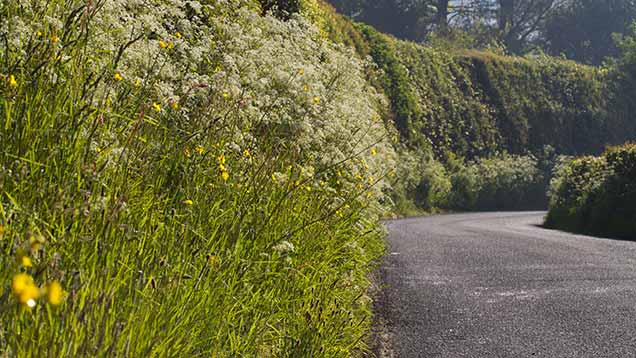Bees shy away from crop-facing hedgerows, finds study
 ©FLPA/Richard Becker/Rex
©FLPA/Richard Becker/Rex The use of pesticides and fertilisers means bees are more than twice as likely to visit flowers on hedgerows facing roads than crop-facing boundaries, a study claims.
Researchers at the University of Plymouth say farming methods may be having a negative impact on the pollination service provided by bees.
Writing in the Journal of Insect Conservation, ecologists said the use of pesticides and fertilisers was reducing food sources for bees.
See also: Bayer loses pesticide bee-harm court case
But Mick Hanley, a lecturer in terrestrial ecology, and conservation biology undergraduate Joshua Wilkins, said encouraging farmers to leave a wider boundary between their crops and hedgerows could lessen the effects of chemicals and help wildflowers to flourish.
For the study, they examined bee habits at 30 sites across Devon and Cornwall.
Dr Hanley said: “There have been hedgerows and field boundaries in these locations for centuries, and even if you go back 50 or 60 years, you would not have seen this phenomenon.
“Both sides of hedgerows would have been flourishing, and bees and other insects would have been numerous on both sides, but that was before an increase in the use of fertilisers.
“Now what you see is the chemicals having impacted one side, with the hedgerows in effect acting as a filter to protect the road-facing edge. It decreases the bees’ sources of food and, therefore, has the potential to impact on their numbers.”
In the research paper, the ecologists said organic farming might offer some advantages for pollinator conservation since it reduces field margin exposure to agrochemical inputs.
But since conventional farming will remain central to global food production, they added, modifications to current practices, such as the use of wildflower strips, may be needed.
“The pesticides and fertilisers in use today tend to mean plants such as nettles flourish, whereas honeysuckle and other bee-friendly species do not,” Dr Hanley said.
“But we would argue that if farmers were a bit more sympathetic, any work they do to encourage bees and other insects could have reciprocal benefits for them and their crops.
“Bees and pollinators fulfil a vital role in the ecosystem services of this country, and there is legislation in places which would allow farmers to do more to support them.”
